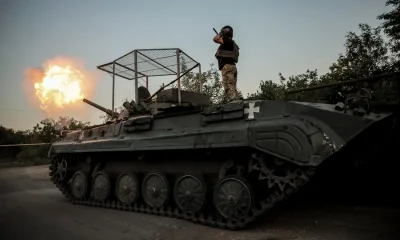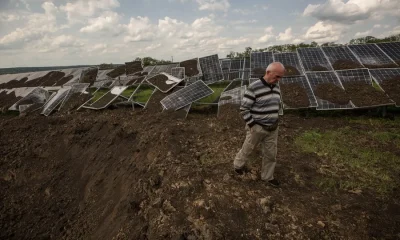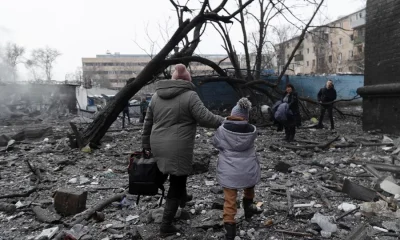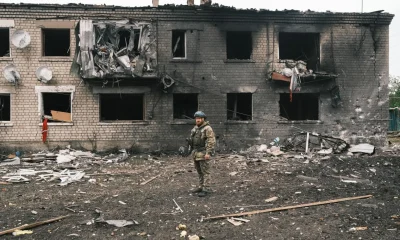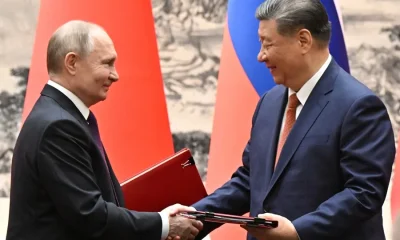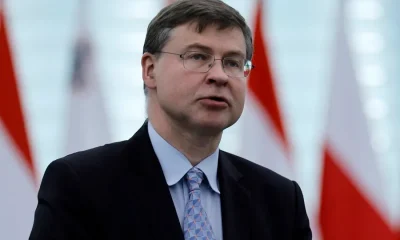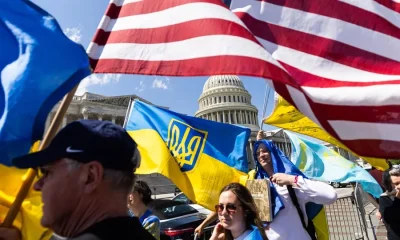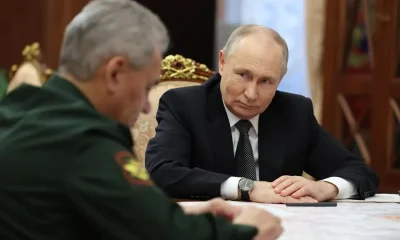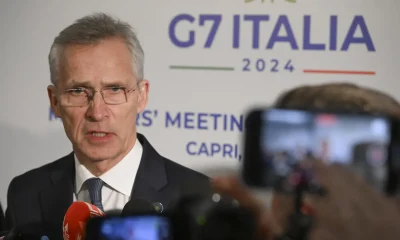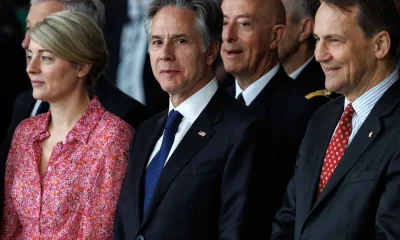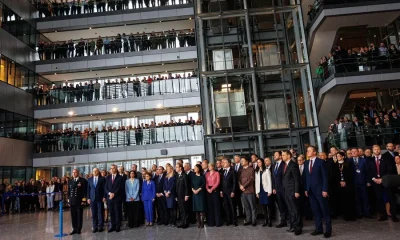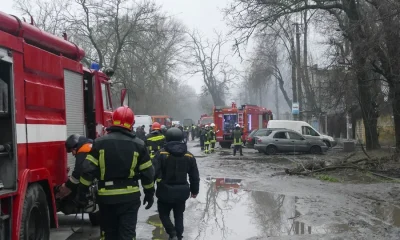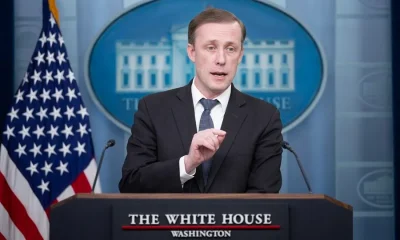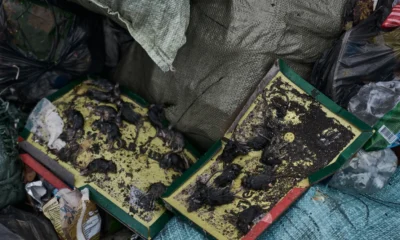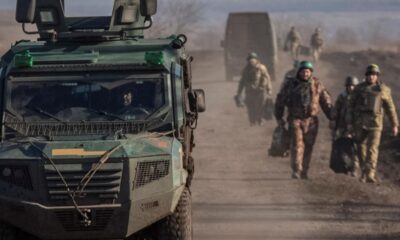International
Ukraine debates the exemption from military service in exchange for higher taxes

Ukraine is studying the possibility of allowing its citizens to avoid mobilization in exchange for a greater contribution to the state budget, in an attempt to find the right balance between guaranteeing enough soldiers for the Army and resources to pay for the defense of the country and an enlistment during martial law that is considered fair.
The Ukrainian Parliament is preparing to review three bills presented by the president of its Economy Committee, Dmitro Nataluja, which provide for the so-called exemption or “economic reserve” of individual employees and entrepreneurs.
Thus, companies will be able to “reserve” their especially valuable employees by paying an additional amount to the state budget of about 470 euros per month for each or when the salary is equal to or greater than 840 euros, since taxes in this case are already high.
Supporters of the idea argue that it would help limit the growing labor deficit in Ukraine, caused by emigration and mobilization, which 58% of companies indicate as the main problem.
According to the European Association of Ukrainian Enterprises, the measure would complement the current reservation mechanism, which is based, among other measures, on mobilization quotas in various sectors considered the most important and is often criticized for its lack of transparency and predictability.
The “economic reserve” would guarantee that companies continue to function, thus boosting the economy and contributing to the financing of the Army, the companies argue.
Currently, the State finances its defense against the Russian invasion only with its own income, while the money contributed by the allies directly to the state budget can only be spent on “civilian” purposes.
According to the Government of Ukraine, at least 11.500 million more euros need to be found in 2024.
Nataluja maintains that his idea can contribute between 4.6 billion and 7.4 billion euros to the budget, which would help equip and pay the soldiers who are being mobilized now.
The fate of the proposals depends on the support they obtain in society depending on their impact on the mobilization.
Vitali, a 35-year-old computer scientist from the city of Lviv, has barely left his apartment in the last half year for fear of meeting on the street with the representatives of the recruitment center.
Since the country currently needs more soldiers on the battlefield, he fears that he will be sent to an infantry unit and be injured or died.
With a monthly income of much more than 400 euros, the average salary of the country, Vitali says that he would be happy to pay to avoid military service, in addition to the frequent direct donations to the Ukrainian Army that he currently makes.
“I would know that I am not doing anything wrong from a legal point of view, I would support our defense effort and I could finally live without fear,” he explains to EFE.
However, for many soldiers and veterans, the introduction of an “economic reserve” would be a hard blow to national unity and the image of the Army.
“It is the principle of social justice that differentiates us from our enemy. We are all equal before the law, in the Army we are all equal and all sectors of the population must enlist,” argues on local television “Express” Oleg Simoroz, a well-known veteran who lost both legs in combat.
Simoroz points out that such “discrimination based on property” or personal wealth has no place in “a civilized democracy.”
According to him, the idea undermines long-term efforts for military service to be considered “prestigious” and that, instead, the Government should increase taxes on oligarchs and optimize its own expenses to find more funds.
Those who defend the proposals point out, however, that the veteran ignores that some pay bribes to avoid mobilization or have difficulties due to the absence of clear rules on the exemption from mobilization.
They believe that the “economic reserve” would make the mobilization more transparent and would also benefit the Army.
International
Thousands rally nationwide against Trump’s threat to U.S. democracy

Thousands of protesters gathered on Saturday (April 19, 2025) in major cities like New York and Washington, as well as in small communities across the United States, in a second wave of demonstrations against President Donald Trump. The crowds denounced what they view as growing threats to the country’s democratic ideals.
In New York City, demonstrators of all ages rallied in front of the Public Library near Trump Tower, holding signs accusing the president of undermining democratic institutions and judicial independence.
Many protesters also criticized Trump’s hardline immigration policies, including mass deportations and raids targeting undocumented migrants.
“Democracy is in grave danger,” said Kathy Valyi, 73, the daughter of Holocaust survivors. She told AFP that the stories her parents shared about Adolf Hitler’s rise to power in 1930s Germany “are happening here now.”
In Washington, demonstrators voiced concern over what they see as Trump’s disregard for long-standing constitutional norms, such as the right to due process.
International
ACLU seeks emergency court order to stop venezuelan deportations under Wartime Law

The American Civil Liberties Union (ACLU) on Friday asked two federal judges to block the U.S. government under President Donald Trump from deporting any Venezuelan nationals detained in North Texas under a rarely used 18th-century wartime law, arguing that immigration officials appear to be moving forward with deportations despite Supreme Court-imposed limitations.
The ACLU has already filed lawsuits to stop the deportation of two Venezuelan men held at the Bluebonnet Detention Center, challenging the application of the Alien Enemies Act of 1798. The organization is now seeking a broader court order that would prevent the deportation of any immigrant in the region under that law.
In an emergency filing early Friday, the ACLU warned that immigration authorities were accusing other Venezuelan detainees of being members of the Tren de Aragua, a transnational criminal gang. These accusations, the ACLU argues, are being used to justify deportations under the wartime statute.
The Alien Enemies Act has only been invoked three times in U.S. history — most notably during World War II to detain Japanese-American civilians in internment camps. The Trump administration has claimed the law allows them to swiftly remove individuals identified as gang members, regardless of their immigration status.
The ACLU, together with Democracy Forward, filed legal actions aiming to suspend all deportations carried out under the law. Although the U.S. Supreme Court recently allowed deportations to resume, it unanimously ruled that they could only proceed if detainees are given a chance to present their cases in court and are granted “a reasonable amount of time” to challenge their pending removal.
International
Dominican ‘False Hero’ Arrested for Faking Role in Nightclub Collapse That Killed 231

A man identified as Rafael Rosario Mota falsely claimed to have rescued 12 people from the collapse of the Jet Set nightclub in Santo Domingo—a tragedy that left 231 people dead—but he was never at the scene.
Intelligence agents in the Dominican Republic arrested the 32-year-old man for pretending to be a hero who saved lives during the catastrophic incident, authorities announced.
Rosario Mota had been charging for media interviews in which he falsely claimed to have pulled survivors from the rubble after the nightclub’s roof collapsed in the early hours of April 8, during a concert by merengue singer Rubby Pérez, who was among those killed.
“He was never at the scene of the tragedy,” the police stated. The arrest took place just after he finished another interview on a digital platform, where he repeated his fabricated story in exchange for money as part of a “media tour” filled with manipulated information and invented testimonies.
“False hero!” read a message shared on the police force’s Instagram account alongside a short video of the suspect, in which he apologized: “I did it because I was paid. I ask forgiveness from the public and the authorities.”
-

 Central America5 days ago
Central America5 days agoPetro questions Ecuador’s vote, cites reports of military control and arrests
-

 International4 days ago
International4 days agoArsenal stun Real Madrid at the Bernabéu to reach Champions League semifinals
-

 International3 days ago
International3 days agoDominican ‘False Hero’ Arrested for Faking Role in Nightclub Collapse That Killed 231
-

 Central America3 days ago
Central America3 days agoNicaraguan Exiles to Mark 7th Anniversary of 2018 Protests with Global Commemorations
-

 International4 days ago
International4 days agoBogotá residents line up for yellow fever vaccine amid national alert
-

 International2 days ago
International2 days agoACLU seeks emergency court order to stop venezuelan deportations under Wartime Law
-

 International4 days ago
International4 days agoDeSantis’ immigration crackdown sparks alarm in Venezuelan Communities in Doral
-

 Central America2 days ago
Central America2 days agoUN complaint filed against Costa Rica over detention of migrant children
-

 International4 days ago
International4 days agoMexico refuses to restore ties with Ecuador while Noboa remains in office
-

 International15 hours ago
International15 hours agoThousands rally nationwide against Trump’s threat to U.S. democracy
-

 International5 days ago
International5 days agoColombia: Search continues for missing limb of italian scientist found dismembered














